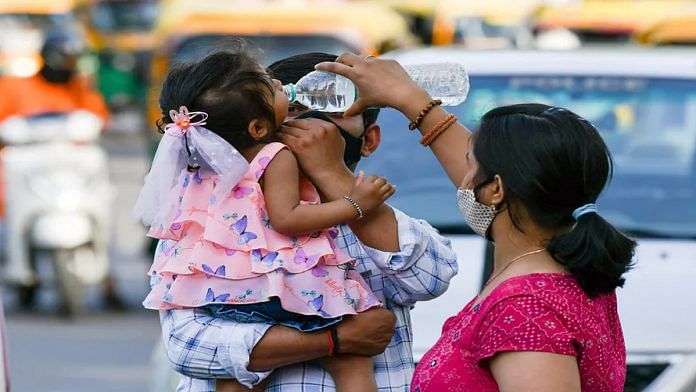New Delhi: There is a 93 per cent chance that one of the years between 2022 and 2026 will be the hottest one in history, when global temperatures are expected to rise by 1.1-1.7 degrees Celsius, the World Meteorological Organization (WMO), an agency under the United Nations, has said.
Till now, the hottest year on record is 2016.
Moreover, according to the WMO’s latest projections, for a brief period within the next five years, global temperatures could cross the mark of 1.5 degrees Celsius above pre-industrial levels, the lower limit set by the 2015 Paris Agreement — an international pact that pledges to keep global warming in check — with the upper limit being 2°C. The consensus is that the effects of climate change will worsen once the upper limit is breached.
The WMO, in its Global Annual to Decadal Climate Update released Tuesday, said that in 2015, there was almost zero probability of a rise in global temperatures temporarily reaching the 1.5 degree-mark. This probability climbed to 10 per cent between 2017 and 2021, and now stands at 50 per cent for 2022-26.
Global temperatures have already reached, and stabilised, at 1.1°C above pre-industrial levels.
Though the predicted rise in global temperatures is likely to be temporary, experts believe its effects could still be harmful and lead to irreversible changes in certain ecosystems.
“The 1.5°C figure is not some random statistic. It is rather an indicator of the point at which climate impacts will become increasingly harmful for people, and indeed the entire planet,” WMO Secretary-General, Prof. Petteri Taalas, said in a statement.
Also Read: A summer like no other? Not really. India has seen worse heat waves
Temporary breach still worrisome
In February this year, the Intergovernmental Panel on Climate Change (IPCC) had, in a report, warned that even a temporary breach of the 1.5°C threshold could lead to irreversible changes in various ecosystems.
“Depending on the magnitude and duration of overshoot, some impacts will cause release of additional greenhouse gases and some will be irreversible, even if global warming is reduced,” the report had said, adding that some of the ecosystems at risk are those with “low resilience”, such as polar, mountain, and coastal ecosystems, impacted by ice-sheet, glacier melt, or by accelerating and higher committed sea level rise.
According to the IPCC, unless greenhouse gas emissions are reduced drastically, the rise in global temperatures will stabilise at 1.5°C by 2040. The probability of it stabilising between 2022-26 is only 10 per cent, the WMO found.
The WMO’s findings are in line with others that predict the world is struggling to achieve goals set in the 2015 Paris Climate Agreement.
Independent research body Climate Action Tracker predicts that existing government policies around the globe are putting the world on the path to a 2.7°C rise in global temperatures.
“A single year of exceedance above 1.5°C does not mean we have breached the iconic threshold of the Paris Agreement, but it does reveal that we are edging ever closer to a situation where 1.5°C could be exceeded for an extended period,” said Dr Leon Hermanson, one of the authors of the WMO report.
(Edited by Amrtansh Arora)
Also Read: India endures severe heat waves — The only reason is global warming




